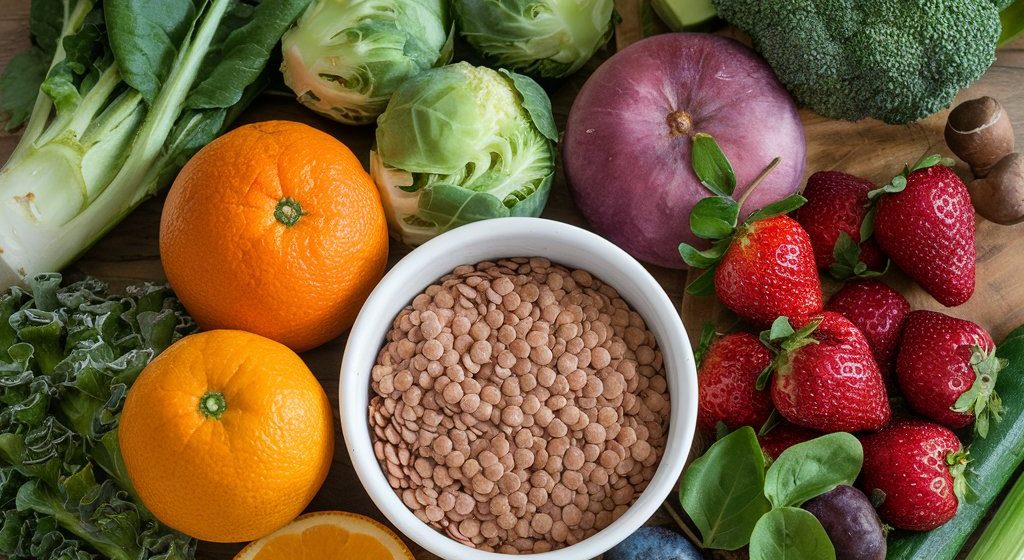Vitamin B9, also known as folate in its natural form (and folic acid when synthesized), is a crucial nutrient that your body needs to thrive. It plays a key role in DNA synthesis, supports cell division, and is vital for the formation of red blood cells. For pregnant women, folate is especially important, as it helps prevent birth defects during fetal development. But even if you’re not expecting, ensuring you get enough folate is essential for maintaining good health.
So, where can you find this super nutrient? Let’s explore some of the best folate-rich foods and why you should make them a regular part of your diet.
1. Dark Leafy Greens: Nature’s Folate Powerhouses
When it comes to folate, dark leafy greens are the undisputed champions. Foods like spinach, kale, collard greens, and romaine lettuce are all packed with this essential nutrient. Just one cup of raw spinach gives you around 58 micrograms of folate. And if you cook that spinach, you can increase your intake to about 263 micrograms per cup. That’s a serious folate boost!
These greens aren’t just about folate, though. They’re also rich in vitamins A, C, and K, as well as minerals like iron and calcium. Plus, they’re low in calories and high in fiber, making them a perfect choice for those looking to maintain a healthy weight.
2. Asparagus: The Elegant Veggie with a Folate Kick
Asparagus might seem like a fancy vegetable reserved for special occasions, but it’s one you should consider eating more often. A cup of cooked asparagus contains approximately 262 micrograms of folate. That’s more than half of the recommended daily intake for most adults!
In addition to folate, asparagus is loaded with antioxidants, which help protect your cells from damage. It’s also a great source of vitamins A, C, and K, making it a well-rounded addition to your diet.
3. Legumes: Small but Mighty Sources of Folate
Legumes, including lentils, beans (such as black beans and kidney beans), and peas, are small but mighty when it comes to folate content. A cup of cooked lentils offers an impressive 358 micrograms of folate, while black beans provide about 256 micrograms per cup.
These nutrient-dense foods are also packed with protein, fiber, iron, and magnesium, making them a perfect option for vegetarians and vegans. Whether you’re adding them to soups, salads, or side dishes, legumes are an easy and versatile way to boost your folate intake.
4. Avocado: Creamy, Dreamy, and Folate-Rich
Avocado isn’t just for guacamole—it’s also a great source of folate. Half an avocado contains around 82 micrograms of this vital nutrient. Its creamy texture and mild flavor make it a perfect addition to salads, sandwiches, and even smoothies.
Beyond folate, avocados are rich in heart-healthy monounsaturated fats, which can help lower bad cholesterol levels. They’re also packed with potassium and fiber, making them a nutritious choice all around.
5. Brussels Sprouts: Little Green Gems of Nutrition
Brussels sprouts might not be everyone’s favorite vegetable, but they’re definitely worth adding to your plate. One cup of cooked Brussels sprouts provides about 94 micrograms of folate. These little green gems are also high in fiber and vitamins C and K, making them a powerhouse of nutrition.
Roasted, steamed, or sautéed, Brussels sprouts are a delicious way to get more folate into your diet while enjoying their nutty, slightly sweet flavor.
6. Broccoli: A Cruciferous Contender for Folate
Broccoli is another green veggie that’s rich in folate, with one cup of cooked broccoli offering about 168 micrograms. It’s also a cruciferous vegetable, which means it contains compounds like sulforaphane that have been linked to cancer prevention.
In addition to folate, broccoli is high in vitamin C, which supports immune health, and fiber, which aids digestion. Whether steamed, roasted, or raw, broccoli is a versatile vegetable that can be enjoyed in countless dishes.
7. Citrus Fruits: Sweet and Tangy Folate Boosters
Citrus fruits like oranges, grapefruits, lemons, and limes are well-known for their vitamin C content, but they’re also good sources of folate. A large orange, for example, provides about 55 micrograms of folate, making it a sweet and tangy way to get some of this essential nutrient.
Citrus fruits are not only delicious, but they also help with iron absorption, support immune function, and offer a refreshing burst of flavor to your meals.
8. Nuts and Seeds: Crunchy Folate-Rich Snacks
For a quick snack that’s rich in folate, reach for nuts and seeds. Sunflower seeds contain about 82 micrograms of folate per ounce, while peanuts offer around 88 micrograms per ounce. These crunchy, tasty treats are also packed with healthy fats, protein, and other vital nutrients like magnesium.
Nuts and seeds are incredibly versatile—you can sprinkle them on salads, add them to yogurt, or simply enjoy them on their own. They’re a satisfying and nutritious way to boost your folate intake.
9. Beets: Vibrant and Heart-Healthy
Beets are not just beautiful with their vibrant color; they’re also packed with folate. One cup of raw beets contains about 148 micrograms of folate. These root vegetables are also high in antioxidants and nitrates, which can help improve blood flow and lower blood pressure.
Beets can be roasted, boiled, or even enjoyed raw in salads. Their earthy, slightly sweet flavor pairs well with a variety of dishes, making them a versatile addition to your diet.
10. Eggs: A Breakfast Staple with Folate
Eggs are a breakfast staple that provides about 22 micrograms of folate per large egg. They’re also an excellent source of high-quality protein, vitamins B12 and D, and choline, which is important for brain health.
Whether you prefer them scrambled, boiled, or sunny side up, eggs are a simple and delicious way to start your day with a dose of folate.
How Much Folate Do You Need?
The recommended daily intake of folate varies depending on your age, sex, and life stage. For most adults, the recommended intake is 400 micrograms of dietary folate equivalents (DFE) per day. If you’re pregnant, you’ll need 600 micrograms per day, and if you’re breastfeeding, aim for 500 micrograms per day.
A Folate-Rich Diet for Better Health
Incorporating a variety of these folate-rich foods into your diet can help you meet your daily needs and support overall health. Whether you’re loading up on leafy greens, enjoying a citrus fruit snack, or adding some legumes to your meals, there are plenty of delicious ways to ensure you’re getting enough folate.
Remember, a well-balanced diet is key to good health, so make sure you’re getting a mix of these folate-rich foods along with other essential nutrients. Your body will thank you!

